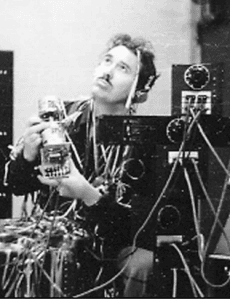Lost Jazz Finds a Home in Harlem
Before yesterday, I had never heard of Bill Savory. For this, I’m thankful: If I had known about Savory, I would have wasted a lot of time and energy being very upset with him. As a sound engineer in the 1930s, he made nearly 1,000 unique recordings of seminal jazz musicians — and refused to let anyone hear them.
Savory pulled this audio from radio broadcasts of live performances, which stations didn’t (or couldn’t) archive. The standard recording format of the day could only accommodate about three minutes of music — fine for studio sessions but inadequate for the longer, more free-form takes musicians played in nightclubs. Savory used large, heavy-duty discs to capture the broadcasts of these sprawling performances, right in his own home. If not for him, incredible performances of classic tunes by the likes of Count Basie, Louis Armstrong, Billie Holiday, and Benny Goodman would have existed only in memories.
But imagine fans’ frustration when he wouldn’t share! Savory was a little eccentric — you’d expect as much from someone who sat at home and recorded his radio for hundreds of hours — and guarded his invaluable recordings so doggedly that only his closest friends ever got to listen. That left many jazz scholars, who had heard of this sealed treasure trove, waiting and hoping for decades for Savory to have a change of heart. After his death in 2004, Savory’s son collected the recordings and thankfully consented to arrange their release. Now the New York Times reports that the National Jazz Museum in Harlem has finally acquired the collection, and expects it to be ready for exhibition within the year.
Savory’s archives are probably more accurate representations of jazz in the 1930s than the studio takes we have now. The Times describes a six-minute version of a Coleman Hawkins song that’s about twice as long as the studio recording: ‘By the last chorus, he has drifted into uncharted territory, playing in a modal style that would become popular only when Miles Davisrecorded ‘Kind of Blue’ in 1959.’ Hawkins anticipating one of the greatest albums of all time by almost 20 years? Jazz buffs, set your mouths to watering.
This reminds me of a much more recent controversy involving a giant of the indie-chamber-baroque-folk-pop-singer-songwriter scene: A Sufjan Stevens song, the only recording of which belongs to one Alec Duffy, who won the song in a contest. It’s practically the same story, with Duffy refusing to release the song publicly. As expected, some people were really upset by this — but Studio 360’s Eric Molinsky learned that Duffy’s got a pretty convincing argument for keeping the song under wraps.
Every day, reporters and producers at The World are hard at work bringing you human-centered news from across the globe. But we can’t do it without you. We need your support to ensure we can continue this work for another year.
Make a gift today, and you’ll help us unlock a matching gift of $67,000!

